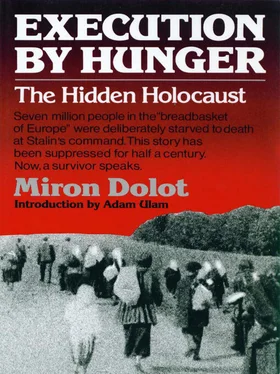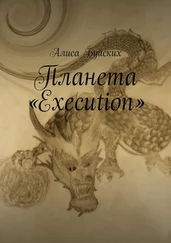One factor was clear: the song of the nightingales was very effectively silenced, and it took quite some time until the nightingales reappeared in our village, much to our great silent rejoicing.
THE FIRST half of June 1932 brought us some relief, and deaths from starvation became less frequent. The early fruits and berries began ripening, and many of the vegetables we grew were ready for consumption. Those who did not have their own gardens and orchards stole from others whatever and whenever they could. At night they would descend on the gardens like swarms of locusts, pilfering everything in sight: green onions; young potatoes; half-grown root vegetables such as carrots, beets, and parsley; strawberries and fruits. Soon, many gardens were completely devastated by them.
Thefts, burglaries, and robberies that were seldom heard of in our region became common occurrences now. A murder or suicide ceased to be a sensational event. Lawlessness was the result of the complete reorganization of communal life and the dissolution of human relationships. The local government, which was supposed to care for law and order became, in the hands of a few Communists, the instrument of our oppression and was either unable or unwilling to give us the protection that as citizens we ought to have had.
For instance, we heard that two brothers, Fedir and Vasil, good friends of mine, were beaten to death and thrown into an abandoned well. It was rumored that they were killed by their neighbor for stealing a cooked meal from his house. Another boy was beaten to death for stealing strawberries from someone’s garden. A young woman met with the same fate for stealing vegetables. In all these and similar cases, no investigations ever took place, no trials were ever held, and no penalties were ever inflicted on those who were responsible.
The kolhosp crop was not safe from the starving farmers either. As soon as night fell, the kolhosp vegetable fields would be swarming with villagers, ravenously hungry. They grabbed everything they could find in the darkness. They dug up potatoes; pulled out young cabbage-heads and root vegetables. This was the time when the heads of grain began to fill out. They became great hunger quenchers for the starving people who flocked to the wheat fields, broke off the heads of wheat, and often ate them right then and there. The wheat heads were also taken home and dried; their grain, even though green and not yet ripe, was used to cook gruel and porridge. Those who worked in the kolhosp fields endeavored surreptitiously to get hold of some vegetables or a few heads of grain to take home and feed to their children and their nonworking family members. But this soon proved to be an unreliable source of food. Comrade Thousander eventually put an end to it: he organized a brigade of “Communist vigilantes” and entrusted them with guarding the kolhosp fields. The vigilantes had been recruited from among the Communist activists, the Komsomol, and also from the schoolchildren. Years later I came across the following statistics provided by Pavel Postyshev, Ukraine’s Moscow-appointed ruler at that time:
In 25 regions of Ukraine, 540,000 children engaged in the protection of crops and in picking of fallen grain, and 10,000 children in the fight against wreckers.
The vigilantes guarded the kolhosp fields day and night. Each worker was not only closely watched in the field, but also bodily searched at the end of each day. This was done on the explicit order of Comrade Thousander who was afraid that the collective farmers might have succeeded in hiding some vegetables or heads of grain under their clothing, even after having been watched so industriously.
Furthermore, to safeguard the 1932 crop against the starving farmers, the Party and government had passed several strict laws. In compliance with these laws, watchtowers were erected in and around the wheat, potato, and vegetable fields. These were the same kind of towers that can be seen in prisons. They were manned by guards armed with shotguns. Many a starving farmer who was seen foraging for food near or inside the fields, fell victim to trigger-happy youthful vigilantes and guards. If some starving person was caught alive while searching for food there, he was severely punished. If he was convicted of theft of “socialist property,” no matter how negligible the amount might have been, he was evicted from his house and banished to a labor camp somewhere in northern Russia.
One of the cruelest laws of all was enacted on August 7, 1932. This law decreed that all kolhosp and cooperative property such as the crops in the fields, community surpluses and storehouses, livestock, warehouses, stores, and so forth, were hereupon to be considered as state owned. The protection of such property from theft was to be enforced in every possible way. The penalties for theft were execution by firing squad, and confiscation of all property of the guilty one. The alternative sentence was no less than ten years of penal servitude in a labor camp, as well as confiscation of property. There could be no amnesty for these so-called felons, convicted of theft from the kolhosp.
This law, as already mentioned, was aimed at the starving farmers. No other interpretation is possible. Only those poor, hungry wretches in quest of food were driven and forced by hunger to steal from the communal, and now state-owned, property. And the state, instead of providing them with food, at least with some meager rations, forced them to steal that “forbidden fruit” and thus become criminals. Not only petty thievery of a potato or a couple of heads of grain from the communal fields was considered a grave offense against the state: it was considered a great crime to even glean the already harvested fields, to fish in the rivers, or to pick up some dry branches in the forest for firewood. After the passage of this law, everything was considered socialist, state-owned property, and thus everything was protected by law.
THE long-awaited harvest of 1932 finally arrived. Its beginning was loudly heralded by endless political speeches.
Sometime in the middle of July, we witnessed the arrival of a combine and two harvesters and, the next day, a small military unit in two trucks. The trucks were parked next to the harvesting machines, and the military found accommodations in the school building. We soon learned that these military people were prohibited from leaving the school premises or associating with us. Sentries were standing around the premises day and night. During the time the military stayed in the village—about two months—we never saw them in the streets or talking to villagers.
The soldiers were followed by a group of students and a group of laborers. The students came from the Teachers’ College, the only institution of higher learning in the county seat. The laborers were from the machine-building factory there. This was the plant, as we often heard, under whose patronage our kolhosp had been formed. These two newly arrived groups were lodged in what had been the parochial school before the church was destroyed. These newcomers were also completely isolated from us.
It was announced that the next Sunday (which was a workday at that time), the wheat harvest campaign would be officially inaugurated. Early in the morning on that day, all the kolhosp members had to appear in the village square. We also heard the rumor that during the inauguration, a hot meal would be distributed. That did the trick! When we arrived, the square was already overflowing with people, even though the day had just dawned, and the sun was barely over the horizon. People in the kolhosp worked not by the clock, but by the sun: from sunrise to sunset.
Just as during the May Day celebration, kettles were hanging over the fire in the center of the square. Around the fire stood a few Thousanders with shotguns slung over their shoulders. A little farther from them were the soldiers in their two trucks. A group of students, and a group of laborers stood separately on either side of the combine. All these official representatives and participants looked solemn. They tried to avoid looking at us, the ragged and hungry collective farmers.
Читать дальше












